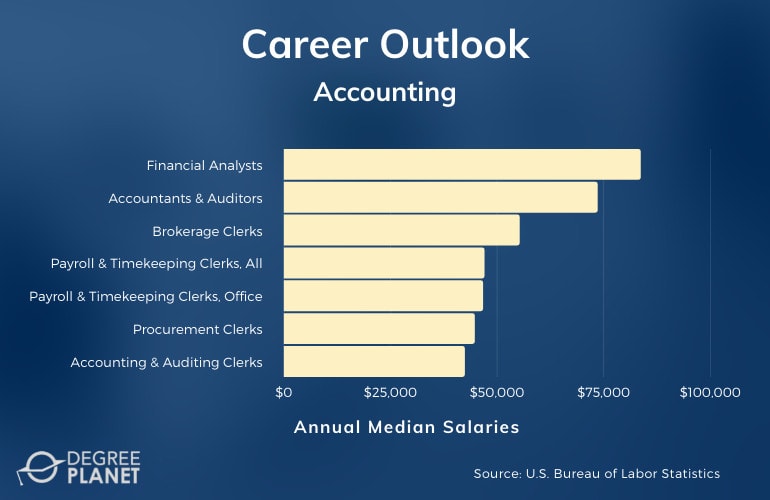Is an accounting certificate worth it? Earning an accounting certificate can take you down one of two paths.

You can either earn one to qualify for an entry-level position at a company, or you can pursue one to advance your existing career as an accountant.
Editorial Listing ShortCode:
An undergraduate certificate for accounting allows you to ease into the field. A certificate can also allow you to gain specialized training after you’ve acquired a degree.
Is an Accounting Certificate Worth It?

Yes, an accounting certificate is worth it for many students. Accounting will always be necessary. Every business, organization, and nonprofit needs to manage their money and financial data. They need to maintain accurate records, comply with federal regulations, and make strategic financial decisions.
Accountants are needed for these vital roles. Growth in this field is often tied to the economy, particularly since each new business needs an accountant. As the economy continues to grow, so will the demand for accountants.
Plus, with the continued globalization of businesses, specialized accountants will be in demand for their expert knowledge in international trade, mergers, and acquisitions.
In fact, the US Bureau of Labor Statistics projects 4% job growth for accountants and auditors over the next ten years. While these positions typically require a bachelors degree, a certificate in accounting can help you enter the workforce in an entry-level position.
Editorial Listing ShortCode:
Accounting can be a flexible career. Professionals in the field work in a variety of industries and in many different roles. They can work part-time or full-time and even freelance.
Your accounting courses can provide you with a solid business foundation as you learn about financial responsibility and practices. This knowledge can be useful in nearly every industry. Those with an accounting certificate tend to pursue positions as accounting clerks or bookkeepers at a business or organization.
Or, if you already have an accounting degree, an accounting certificate can help propel your career forward. A certificate may increase your employability or lead to promotional opportunities, depending on your experience and position.
How to Decide Whether an Accounting Certificate Is Right for You

Accounting certificate programs can provide useful certifications that are incredibly versatile, which can in turn supply you with more career opportunities.
1. Accountants are lifelong learners.
Do you love to learn? Receiving certification in accounting can help you begin or advance your training in the accounting sector.
Professionals in this field are continually learning and adapting. An accountant’s role can change as both technology and regulations progress.
2. Accountants are needed in every industry.

Are you looking for a career that allows you to work nearly anywhere? Accountants are needed in nearly every business and organization.
When it comes to your area of study, you can choose to specialize or generalize. Professionals can work for the government, in a large accounting firm, or even for a small pet business or a nonprofit organization.
3. An accounting certificate offers flexibility.

If you aren’t sure if accounting is right for you, an accounting certificate can help you “get your feet wet.”
After earning your accounting credentials, you may choose to find work as a bookkeeper or accounting clerk to test the waters and see if accounting is what you want to do. If you decide you enjoy accounting and want to further your education, certificate coursework credits often transfer to an associates or bachelor degree program.
You can also specialize with a certificate program or pursue certification. Common certifications include certified public accountant (CPA), certified internal auditor (CIA), and certified management accountant (CMA).
5 Things You Can Do with an Accounting Certificate

Many people pursue accounting certifications without a degree in order to gain entry-level employment into a company, business, or accounting firm. If you are interested in taking this route, here are five possible career paths for you to consider.
1. Accounting Assistant
Accounting assistants generally provide basic accounting duties, such as keeping accurate financial records, assisting with office administration, and handling the company’s cash.
They usually work in accounting departments of large companies or in an office with a private accountant. Accounting assistants help and support a qualified accountant with their job duties. If you decide to become an accounting assistant, you could learn a lot of skills on the job.
2. Accounting Technician

Accounting technicians perform basic accounting duties as well, such as reconciling accounts receivable and accounts payable. They may also perform bank reconciliations, manage the payroll process, and send bills or invoices to customers.
Accounting technicians are usually based in a financial service unit or an accounting department of a larger firm, business, or company.
3. Accounts Payable and Receivable
This position can actually be held by two separate people: one for accounts payable and one for accounts receivable. Most small companies, though, combine the two into one person.
Editorial Listing ShortCode:
An accounts payable and receivable manager can collect delinquent debt, notify customers of insufficient payments, prepare financial reports, and maintain accounting ledgers. If you decide to work as an accounts payable and receivable manager, your responsibilities will generally depend on where you work.
4. Auditing Clerk
An auditing clerk reviews accounting records and checks financial data for accuracy. They might also verify financial records and statements created by other employees.
Some auditing clerks even take on additional responsibilities in other departments, such as accounts payable or accounts receivable, auditing, and payroll. Auditing clerks may perform general bookkeeping tasks as well.
5. Bookkeeper

Bookkeepers have a wide variety of duties they can perform. Their tasks depend on the company they’re working for.
Generally, they provide accurate, up-to-date financial information to business managers or owners to help them make financial decisions. Sometimes they are also involved in the company’s financial strategy. They can also perform basic tasks, such as data entry, bank reconciliation, and monthly reports.
Accounting Certificate Alternatives

You don’t have to stop at an entry-level position in accounting. You can either further or begin your education with a degree, or you can even take accountant certification programs to specialize.
- Associates in Accounting. An associate in accounting is often a 2 year program, comprised of both general liberal arts and accounting courses. Accountants with an associate degree generally make more than those with only a certificate.
- Bachelors in Accounting. A bachelor’s degree not only earns more but also opens the door to specialization. Many accounting and financial positions require a bachelors.
- Certificate in Public Accounting. If you hold a bachelors, there are a number of graduate certificates of various specialties you can pursue. A public accounting certificate is the most common graduate certificate for accounting, as it can lead to being a certified public accountant (CPA).
An accounting certificate can help you get started on your career, or it can help you niche down into a certain field or specialty.
Accounting Careers & Salaries

According to the Bureau of Labor Statistics, financial analysts, accountants, and auditors typically require a bachelors degree, and graduate certificates can help you advance in these positions. Financial clerk positions can generally be obtained with an undergraduate certificate.
| Careers | Annual Median Salaries |
| Financial Analysts | $83,660 |
| Accountants and Auditors | $73,560 |
| Brokerage Clerks | $55,270 |
| Payroll and Timekeeping Clerks, All | $47,020 |
| Payroll and Timekeeping Clerks, Office Administrative Services | $46,680 |
| Procurement Clerks | $44,740 |
| Bookkeeping, Accounting, and Auditing Clerks | $42,410 |
| Insurance Claims and Policy Processing Clerks | $42,050 |
| Financial Clerks | $41,520 |
| Bill and Account Collectors | $38,100 |
An accounting certificate can allow you to enter the workforce, and it can also act as a foundation for further study if you decide to pursue a degree down the road.
What Can You Do with an Accounting Certificate?

With an accounting certificate, you can choose to either start your career or advance your current career in accounting.
If you aren’t sure if accounting is right for you, you may want to start with a certificate. A certificate can help you get a job as a bookkeeper or clerk. You’ll have a chance to work in the field to determine if you enjoy the work.
Editorial Listing ShortCode:
Or, if you can’t afford to further your education, you can earn your certificate first. You can then pursue your bachelors degree while working. If you already hold a bachelors degree, an accounting certificate can help you specialize, expand your skills, and earn more.
Is Accounting Hard?

Whether the field of accounting seems hard may depend on your individual aptitudes and interests. If you pursue a certificate in accounting, you may take courses in managerial accounting, financial accounting, intermediate accounting, and federal taxation.
If you pursue an accounting degree, you’ll take more advanced accounting courses as well as courses in mathematics, economics, and business. You may also be required to take a few electives, which can help tailor your certificate to your specialty.
Communication and critical thinking classes may also be required. Some accountants are expected to communicate outcomes and strategies with company stakeholders.
Is There a Demand for Accountants in the Future?

The Bureau of Labor Statistics projects 4% job growth for accountants and auditors. Accountants are expected to be in increasing demand as the economy grows and businesses continue to go global.
On the other hand, increased technological advances have automated many basic accounting tasks that are traditionally done by bookkeepers and accounting clerks. There are still available jobs for these positions, but they are not growing as steadily as full-fledged accountants.
What Jobs Can You Get with a Certificate in Accounting?

Accounting is a good major for many students, and accountants work in nearly every industry because all businesses, companies, and organizations need an accountant to manage their financials.
The majority of accountants are hired in the professional, scientific and technical services, according to the Bureau of Labor Statistics. This industry includes jobs in accounting, tax preparation, bookkeeping, and payroll services.
A bachelors degree is required for most accountant positions, but a certificate in accounting can help qualify you for entry-level clerk positions. Financial clerk positions can include accounting clerk, bookkeeping clerk, and payroll clerk, among others.
What’s the Difference Between an Accounting Certificate vs. Degree?
An undergraduate certificate allows you to get a taste for college courses without the commitment of a degree program. With a certificate, you can receive training to begin or advance in the workforce and lay a foundation for potential further study.
| Accounting Certificate | Accounting Degree |
|
|
A bachelors degree is often required in order to become an accountant or auditor. Those who earn accounting certifications without a college degree tend to pursue entry-level positions as financial clerks. To decide which path is right for you, it can help to determine what you want out of your career.
What’s the Difference Between Finance vs. Accounting?
Accounting and financial experts are not one and the same. Financial specialists help plan and direct an organization’s financial transactions. Accountants focus on recording and reporting financial transactions.
| Finance | Accounting |
|
|
Those who specialize in finance can help guide a company’s financial decisions. Professionals in accounting can manage a company’s financial data.
Getting Your Accounting Certificate Online

By earning a certificate in accounting, you can gain the necessary knowledge and skills to build a solid business foundation. Your learned skills can be applicable in a variety of fields as well.
A certificate can help you qualify for entry-level employment, prepare for advancement, or gain specialized knowledge. If you already have a degree, a certificate can give you additional specialized training as well as an edge on the competition.
There are even online accounting certificate programs that allow you to earn your certificate according to your own schedule. These programs may help you establish a foundation in accounting if you do decide to pursue a bachelors in accounting online, for example.
Some accredited schools even offer accelerated programs so you can enter the workforce more quickly.
If accounting is in your future, you can start your educational journey by exploring accredited accounting certificate programs today!

